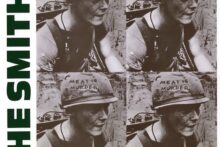There used to be something interesting about Primal Scream. Countless bands start off promisingly before their output steadily declines. A few beat combos remain relatively consistent. There’s been a tiny amount who just kept getting better and then stopped (Fugazi). Did any band fluctuate from decent records to terrible ones quite so erratically as Primal Scream?
Far from the only instance, the classic example of this was their decision to follow 1991’s indie-dance smash Screamadelica with Give Out But Don’t Give Up, a turgid act of regression with more ballads than Adele’s Las Vegas residency.
The same inconsistency applied to their concerts. Any long-term Primals fan will have seen them play spectacular, fired up and potentially even transcendent shows (intoxication depending). They will also, inevitably, have witnessed nights when the group were woefully chronic. Sometimes the band would play a mediocre festival set and then Bobby Gillespie would stick two fingers up when departing the stage and bare his chicken flesh bum cheeks to the audience as if it was all their fault.
Let’s face it, Primal Scream’s strongest moments have been those when Gillespie was hardly in the foreground. No one remembers Screamadelica on account of his (occasional) vocals. There were long instrumental passages on 1997’s Vanishing Point where Gillespie’s presence wasn’t required and, back then, he realised this (or was too strung-out to care). During their exciting cyberpunk period of the early 2000s, there was so much going on sonically that it almost didn’t matter what Gillespie was shrieking about (something to do with Nazis, the Pentagon and amphetamines).
Recently, however, Gillespie has become convinced he’s a good singer when in reality his signature drawl is only slightly more robust than the floppy-disc flatness of his contemporary, Ian Brown.
On Utopian Ashes, an album of fogeyish duets with ex-Savages vocalist Jehnny Beth, Gillespie strove to reinvent himself as a torch crooner, albeit one who still needed assistance from another singer. Following that yawn-inducing effort, Come Ahead was initially conceived as a solo album. We’re told it turned into a Primal Scream record when Gillespie asked the only other member remaining from their 1987 debut LP, Andrew Innes, to play some guitar on it. Given Innes also appeared on Utopian Ashes, it’s feasible the accountant looked at the sales of that LP, then at Gillespie’s outgoings, and firmly advised marketing the new one under the long-running b(r)and name.
It is unclear how much Innes has contributed. In the lengthy and entirely Bobby-focused press release for Come Ahead, Innes is mentioned only once. The band, if that is what it is, has also changed its working methods. In the past, Primal Scream albums have had their music written and embellished in the studio first. Gillespie then added words to the music they’d concocted as a collective. Or didn’t, when it came to their instrumentals or guest vocalled tracks, and that’s a sizable amount of their back-catalogue. This one began with Gillespie’s lyric-driven songs. This is a big mistake and one that even producer David Holmes cannot rescue from the jaws of the bargain bin.
Holmes was present on Primal Scream’s greatest album, XTRMNTR (2000), a paranoid and post-rave instant classic that served, as Lee Brackstone has described in these pages, “as a kind of enema for the decade just past.” Holmes also helmed their last passable one, 2013’s More Light (which was followed in typically unreliable fashion by the wretchedly flimsy Chaosmosis in 2016). Anyone hoping Holmes might help return what’s left of Primal Scream to some sort of form is going to be let down by Come Ahead’s feeble Chic guitar facsimiles, light and sexless white-funk basslines, easy listening woodwinds and so much stock string accompaniment it’s like hearing the producer’s audition tape for one of those smug Ibiza Proms events.
The first voices to appear on the album are those of a gospel choir, which indicates they are going to do a lot of the heavy lifting on the choruses throughout the LP. That’s true of the next track, ‘Love Insurrection’, and the backing singers do try their best despite it having a vocal melody that barely exists. That applies to the next song, too. So it continues.
Then there are the words, on which Gillespie worked so hard before whining them into the least fortunate microphone since that owned by Morrissey. To say this 63-year-old is still writing sixth-form poetry is an insult to the nuanced submissions of this year’s A-Level candidates.
‘Innocent Money’ starts off as a poverty porn character observation on homelessness before it is pointed out, helpfully, that trickle-down economics don’t actually help the poorer members of society as it has promised to since before the 1980s. Well, duh. The condemnation of Thatcherite neoliberalism continues on the moody ‘Deep Dark Waters’. This is one of the album’s better tracks thanks to its Spanish guitar licks, stompy drumbeats and general woozy atmosphere. “We bomb and when they run / We tell them they can’t come,” our down-with-the-kids supply teacher tells us, “Just like in World War II / We showed no pity on the Jews…”
The piano-based ‘Melancholy Man’ is unintentionally, laughably abysmal: “See the melancholy man / Happiness is in his hand / He doesn’t really understand / Lets it slip away like sand / Everything within his grasp / Trying to let go [of] the past / If only he could see / Only he can set him free…” It’s as if Damon Albarn wrote a parody of his own worst slow song while trapped within a long Covid coma. At least Gillespie shuts up during the saxophone solo.
‘False Flags’, meanwhile, tells the story of a young man from the same background as Gillespie who doesn’t become a pop singer but joins the British army instead and ends up “dying for a cause that means nothing”. It’s supposed to come across as sympathetic but it just seems patronising, like a Michael Moore documentary without the skits.
You could say this is all well-intentioned. The world is in an awful state and we have Bobby Gillespie to thank for pointing out its ills to the public. There are, of course, many who believe that when he shouts his socialist credentials from the rooftop, it is nothing but empty, performative posturing. Strip him of his bluster and you’ll get down to a self-serving and sanctimonious hypocrite. A leftier Bono, if you like, wearing similar sunglasses. We needn’t go into all the details and evidence in this space. There’s a whole internet out there that’s full of the stuff.
There is an elephant in the room, however. Namely, the treatment of Gillespie’s former colleagues. Although people have said there are other sides to the stories, what happened to Martin Duffy and Denise Johnson have not painted Primal Scream in a generous light. With their guitarist now seemingly on the sidelines as well, could Innes be wondering if his days are numbered too? Some members of Primal Scream are more equal than others.
The only participant to appear on the front covers of More Light and Chaosmosis was the singer. Come Ahead’s equivalent features an old photograph of Gillespie’s father, in shades and a dapper suit, looking rather a lot like his rockstar son. Primal Scream is now The Gillespie Show and what a lamentable shitshow it has become. It would take a hell of a reinvention to pull back Primal Scream from this stinking brink. Come Ahead is a record that fails, fatally, to recognise that Bobby Gillespie was always Primal Scream’s least compelling element.




